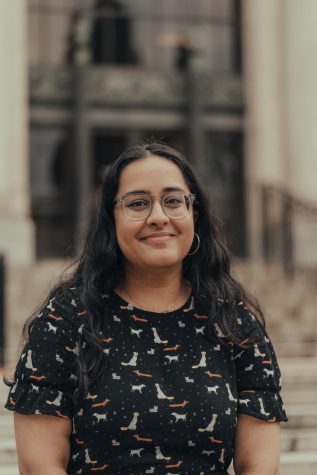City Council tackles new year with bias response initiative, community engagement plans, transportation updates and more
January 4, 2021
Going into the new year, Corvallis Mayor and Corvallis City Council have several projects in place to fully establish the bias response initiative, improve public participation, and support local businesses through the pandemic.
Reflecting on the last year, Mayor Biff Traber said the biggest accomplishment was helping the Council support City staff with the COVID-19 emergency while completing needed business.
“Within COVID-19, the City has done a tremendous job of continuing City services at a high level of service while also pivoting to help local business survive the impact of the virus,” Traber said via email. “The needed business of the City included progress on priority topics of housing and climate change and beginning to focus on dealing with racial and social justice issues in Corvallis. On housing, the City has continued to move forward with removing barriers and refining regulations for more [of] the housing the City needs. On climate change, a notable event was the first releases of our every two-year community Greenhouse Gas inventory.”
For Council President and Ward 3 Councilor Hyatt Lytle, the most important accomplishments last year included providing City funding for a Corvallis hygiene center after the pandemic began and also hiring a new municipal judge.
“There are so many heroes that were a part of the effort that led to the City funding $150,000 at the June 2020 Budget Hearing for a bias response initiative, and I was incredibly honored to play my small role in the strategy this past year that led us to the funding allocation on June 1 and where we are now with the initiative,” Lytle said via email. “I believe it was late January or early February this past year where members of NAACP Leadership, Corvallis Action and I had met to discuss the potential funding opportunity with the City for Bias response prior to the City’s Budget cycle.”
Following the tragic passing of George Floyd on May 25 – just a week before their Budget Hearing meeting – Lytle said their group heard from a plethora of community members sharing their personal experiences with racism and bias in Corvallis, pointing out the need for a bias response program in the City.
“Now, a little over six months later, the planning for the City’s bias response initiative has been evolving and taking shape,” Lytle said. “Unfortunately, with COVID-19, intended partnerships have been unable to participate due to their own financial strains; however, looking towards efforts with our neighboring cities Philomath and Albany – both were on board to join the initiative.”
Although the initiative is still in the making, Lytle said it has garnered strong support from the City and community and believes groundbreaking work will come from it.
She hopes to see the initiative have a project manager in 2021 who will begin an outlined process to start an inventory of local bias and hate incidents, so that community members can report incidents and easily find local resources to help them deal with any consequent harm and trauma.
The bias initiative response is one of many other City projects in the works for 2021, detailed in Council’s Strategic Operating Plan, a five-year compilation of highlighted City projects organized by their 2040 vision’s focus areas: Engage & Support, Steward and Sustain, Learn & Thrive, Innovate & Prosper, Create & Celebrate, and Plan & Change.
According to Lytle, continuing projects in 2021 include the bias response initiative and the charter review – which includes the community portion of the Budget Commission, in which Mayor and Council stipends are reviewed.
Notable new initiatives in 2021 include endorsing Corvallis as an ‘International Association for Public Participation’ City and the City’s involvement in the new Mental Health Crisis Response Partnership between Benton County, Oregon State University and Corvallis.
Endorsing Corvallis as an IAP2 City was a proposal that Lytle herself brought forward.
“I want to be clear that this is strictly my own opinion; however, for far too long, Corvallis Advisory Boards have seemed to be how community members participate and engage with the City; to a point, the entire model had become rather siloed,” Lytle said. “Boards had either not enough or no direction from Council, most were not being used in an advisory capacity or others were looking for things to do and creating projects with no communication with Council.”
As a member of the Advisory Board Restructuring Committee last year, Lytle explained that the concept of how the City treats public engagement moving into a new board model was very important to her.
“It is one of my own goals this entire next term to work on how we reframe and enhance how the community understands and perceives public engagement with the City,” Lytle said. “IAP2 is an entire organization and framework, which is built on the tenets of engagement between organizations and outside members and how that relationship relies on one another to thrive. I am a firm believer in democracy and representation, and the reason Corvallis has nine Councilors and nine Wards is to promote representation of a diverse population and we need the right vehicle to get us there.”
Additionally, Lytle noted that recently, there have been policy shifts in municipalities that aim to use social justice and diversity, equity and inclusion as a lens in decision making at the government level. Thus, she proposed adding a policy priority to the SOP that states: ‘The City maintains that diversity, equity and inclusion are integral to both policy-making and the delivery of City services.’
“I would like to see Corvallis begin our own shift of looking at decisions through this lens, as well as the many other lenses we use when we make critical decisions at the City level,” Lytle said.
Barbara Bull was the 2015-2020 Ward 4 Councilor for Corvallis, the region which encompasses the Oregon State University campus. Though her term as Councilor ended with the start of 2021, during her time as Councilor, she participated in the development of proposals and plans in place to help the City’s development.
She said residents should see a lot of progress in South Corvallis on affordable housing, improved plans for South 3rd, and engagement with a specific area plan.
Additionally, the Oregon Department of Transportation will revise its upcoming spending plan, the Statewide Transportation Improvement Program, to emphasize sustainable projects over highway spending. This is projected to have a major impact on the GHG initiative because approximately 40% of greenhouse gas emissions in Corvallis originate from the transportation sector.
She added that the Corvallis area’s regional transportation plan is also set to be updated by the Corvallis Area Metropolitan Planning Organization during 2021. Corvallis has its own transportation plan separate from the regional one includes Philomath, Adair, and Benton County.
“We have an opportunity locally to take a closer look at how we can make sure our own transportation spending is in line with our sustainability goals,” Bull said. “It is technical but very important to things we care about like sustainability and bike and pedestrian safety.”
Additionally, Bull said she would like to help Ward 4 develop more neighborhood organizations, which, like IAP2, would encourage public participation.
“That would help the area advocate for issues that are important to them, and to participate in issues like new zoning regulations and the implementation of new parking districts as they come up,” Bull said. “It would be helpful to Ward 4, including OSU, to have more support navigating historic preservation regulations.”
As of Jan. 2021, Ward 4 Councilor is Gabe Shepherd. For him, like Lytle, one of the most important projects in the works is the bias response initiative, while also having a personal goal to continue to make Corvallis a statewide leader in climate action.
Looking to the future, Mayor Traber also has a positive outlook. He said he would like to see Corvallis successfully weather the COVID-19 emergency with low infection numbers, have people follow guidelines, get vaccinated and also see businesses recover.
“I hope for survival and then recovery,” Traber said. “As it has done this year, the City will do all it can through the Corvallis Benton County Economic Development Office and the Community Development Department. This includes grants, loans, technical help, regulatory changes and support with business generation.”
He added that much of what the City can do will depend on further relief funding from the state and ultimately the federal government.
“We all need to stay safe, healthy and optimistic,” Traber said. “We will get through this.”











































































































